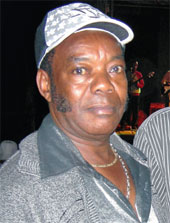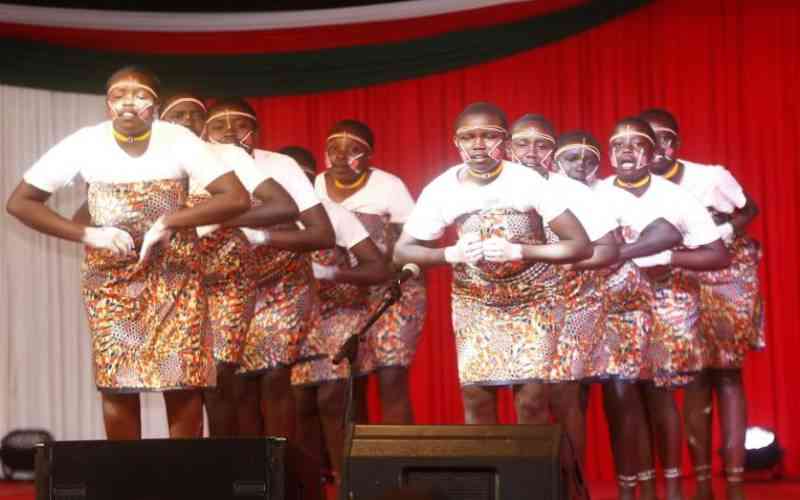By Kiundu Waweru
For more than two decades, the ‘train’ has drove revellers in a crazed journey of musical fantasy in entertainment spots locally and beyond.
Christened ‘Mugithi’ and featuring one man guitarists strumming electric benga tunes, the genre has broken barriers, cruising across ethnic divides, gender and even the social class, so much that one scholar has researched on Gikuyu music for his PhD.
Maina wa Mutonya, a research professor at Centre for Asian and African Studies in Mexico, did not shy away from the genre which features lewd lyrics.
Ironically, lewd as Mugithi may seem, it was adopted from the Christian night vigils (keshas) where the faithful link up to "join the train to heaven" with Jesus as the driver.
However, Maina sees the artistes’ indulgence in taboo subjects like sex, which earlier artistes hardly touched, as pointing to a major innovation in Kenyan music.
But the Mugithi music genre is much more than that, he says, as it encompasses social, economic and political situation of the 1990s in Kenya.
"Culture forms an integral part of the expression of issues of everyday life. It is an analysis of the popular music of the Gikuyu people between 1990 and 2000 as a cultural production that has portrayed the daily struggles, hopes, aspirations, impediments, desires, disillusionment, anxieties and fears of everyday life," he writes.
 |
Musician DK Kamau ‘Wamaria’. [PHOTOS: KIUNDU WAWERU/ STANDARD] |
In this period, Kenya was experiencing an economic depression and many club owners resorted to hiring solo artistes, instead of entire bands, which would mean higher costs.
Also, the artistes felt the pinch of the economic depression and they had to make do with less expensive instruments. The late Jean Bosco Mwenda is credited with heralding the Mugithi era, strutting his stuff at the Ngong Hills Hotel, armed with only a guitar. With no back up drummers, Mwenda belted popular cover versions of Gikuyu and Swahili numbers, which he often flavoured with his own lyrics. Other Mugithi artistes that Maina analyses include the ever popular Mike Rua, Mike Murimi and Salim Junior.
Making bars as performance stages amid much criticism for dealing with issues of ‘sexuality ad nauseam,’ Maina says that was due to low turn out of audiences in convectional theatres.
The researcher writes that Mugithi performance, that is rooted in the life of the urbanite, saw artistes exploit the interest of the urban masses in crime, corruption, adventure and intrigue, sex, love, romance, conflicts of cultures, linguistic innovations, idiosyncrasies and stereotypes.
And speaking of sex, Mugithi is notorious for the lewd terms, especially late into the night when it’s time for revellers to ‘touch what they don’t have." On this, Maina says Mugithi is performed for a cosmopolitan audience, apt to embrace modernity with its sexual expression and drinking seen as ‘the in thing’ as compared to the more conservative traditional artistes and Christians who forbid sex talk as evil. Mugithi is also seen to have a subtle connection with Mwomboko, a traditional Gikuyu form in which there were no inhibitions on matters of sex and sexuality.
Also acting as a form of political-moral category, Mugithi survived suppression of the last regime where popular music was misinterpreted as having subversive material and consequently banned. This is because Mugithi was not recorded but instead was performed live. The patrons perceived bars as a world stage upon which the feelings of powerlessness could be expiated.
Stay informed. Subscribe to our newsletter
Banned were David Karanja’s song, Gitumia Giki (This Other Woman), a clear cry from a son who had been mistreated by the stepmother. Also Peter Kigia’s Reke Tumanwo, (Quit the Affair), a lament of a marriage gone sour, was not spared either.
The one man guitarists favorite renditions include Tabu Ley’s hit Muzina which is corrupted to match with the Gikuyu male name, Mucina; the Jamaican ragga duo Chaka Demus and Pliers song, Murder She Wrote corrupted to Mama Ciru; A Luhya wedding song, (Ng’ombe); Princess Julie’s Dunia Mbaya and Kalenjin Sisters’ song, Magtalena. The corruptions forge a synthesis of local traditional cultures and foreign modern way of life and even technology.
And Mugithi having originated from the prayer night-vigils, the bawdy musicians do not spare the gospel songs either, corrupting the pious lyrics to secular connotations.
And as Mugithi gained popularity, other musicians not necessarily from the Gikuyu community took the genre. In this regard, Maina concludes: "The challenge for vernacular musicians is to integrate the specific cultures of the various communities into the national whole. This is crucial because it is the different cultural values from all Kenyan communities that constitute the Kenyan national culture."
 The Standard Group Plc is a
multi-media organization with investments in media platforms spanning newspaper
print operations, television, radio broadcasting, digital and online services. The
Standard Group is recognized as a leading multi-media house in Kenya with a key
influence in matters of national and international interest.
The Standard Group Plc is a
multi-media organization with investments in media platforms spanning newspaper
print operations, television, radio broadcasting, digital and online services. The
Standard Group is recognized as a leading multi-media house in Kenya with a key
influence in matters of national and international interest.
 The Standard Group Plc is a
multi-media organization with investments in media platforms spanning newspaper
print operations, television, radio broadcasting, digital and online services. The
Standard Group is recognized as a leading multi-media house in Kenya with a key
influence in matters of national and international interest.
The Standard Group Plc is a
multi-media organization with investments in media platforms spanning newspaper
print operations, television, radio broadcasting, digital and online services. The
Standard Group is recognized as a leading multi-media house in Kenya with a key
influence in matters of national and international interest.









